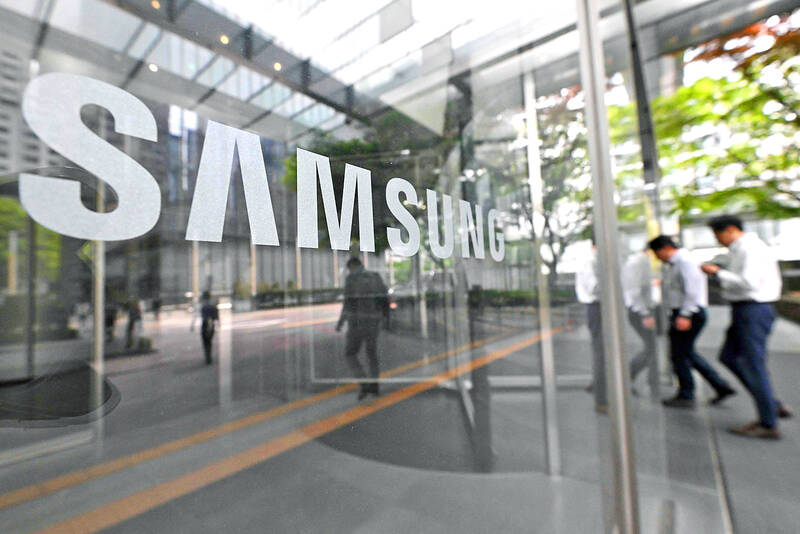Samsung Electronics Co unveiled a number of forthcoming advancements to its technology aimed at attracting makers of artificial intelligence (AI) chips.
Although, Samsung is the world’s No. 1 memorychip maker, it has been trying to catch up with rival Taiwan Semiconductor Manufacturing Co (TSMC, 台積電) in the foundry market, where companies manufacture customer-designed chips.
Samsung’s share in the foundry market slid to 11 percent in the first quarter of this year from 11.3 percent in the previous quarter, while TSMC’s share climbed to 61.7 percent from 61.2 percent during the same period, according to Taipei-based research house TrendForce Corp (集邦科技).

Photo: AFP
Samsung on Wednesday announced several new types of production technology and laid out its chipmaking road map and outlined its vision for the AI era at its annual foundry forum in San Jose, California.
The advanced process introduced by Samsung uses so-called backside power delivery network technology, which places power rails on the backside of a silicon wafer. Such technology enhances power, performance and area, while significantly reducing the drop in voltage, compared with its first-generation 2-nanometer process, the company said.
The South Korean chipmaker also said that its ability to offer logic, memory and advanced packaging would help it make rapid progress in winning outsourced semiconductor manufacturing orders for AI-related chips.
The company predicted that its AI-related customer list would expand five-fold and revenue would increase by nine times over current levels by 2028.
Samsung executives declined to comment on the status of the company’s attempts to supply the latest advanced memory chips to Nvidia Corp, which produces AI accelerators that are a must-have for all large technology companies.
They also did not respond to reports that it has not yet been able to achieve qualification of such chips at the US company.
The company touted its gate-all-around (GAA) technology, which is key for AI products.
Samsung said it plans to mass produce its second-generation 3-nanometer process in the second half of this year and deliver GAA on its upcoming 2-nanometer process.
In 2022, the company became the first in the industry to begin GAA-based 3-nanometer mass production.
The chipmaker affirmed that its preparations for 1.4-nanometer are progressing smoothly, with performance and yield targets on track for mass production in 2027.

TAKING STOCK: A Taiwanese cookware firm in Vietnam urged customers to assess inventory or place orders early so shipments can reach the US while tariffs are paused Taiwanese businesses in Vietnam are exploring alternatives after the White House imposed a 46 percent import duty on Vietnamese goods, following US President Donald Trump’s announcement of “reciprocal” tariffs on the US’ trading partners. Lo Shih-liang (羅世良), chairman of Brico Industry Co (裕茂工業), a Taiwanese company that manufactures cast iron cookware and stove components in Vietnam, said that more than 40 percent of his business was tied to the US market, describing the constant US policy shifts as an emotional roller coaster. “I work during the day and stay up all night watching the news. I’ve been following US news until 3am

UNCERTAINTY: Innolux activated a stringent supply chain management mechanism, as it did during the COVID-19 pandemic, to ensure optimal inventory levels for customers Flat-panel display makers AUO Corp (友達) and Innolux Corp (群創) yesterday said that about 12 to 20 percent of their display business is at risk of potential US tariffs and that they would relocate production or shipment destinations to mitigate the levies’ effects. US tariffs would have a direct impact of US$200 million on AUO’s revenue, company chairman Paul Peng (彭雙浪) told reporters on the sidelines of the Touch Taiwan trade show in Taipei yesterday. That would make up about 12 percent of the company’s overall revenue. To cope with the tariff uncertainty, AUO plans to allocate its production to manufacturing facilities in

COLLABORATION: Given Taiwan’s key position in global supply chains, the US firm is discussing strategies with local partners and clients to deal with global uncertainties Advanced Micro Devices Inc (AMD) yesterday said it is meeting with local ecosystem partners, including Taiwan Semiconductor Manufacturing Co (TSMC, 台積電), to discuss strategies, including long-term manufacturing, to navigate uncertainties such as US tariffs, as Taiwan occupies an important position in global supply chains. AMD chief executive officer Lisa Su (蘇姿丰) told reporters that Taiwan is an important part of the chip designer’s ecosystem and she is discussing with partners and customers in Taiwan to forge strong collaborations on different areas during this critical period. AMD has just become the first artificial-intelligence (AI) server chip customer of TSMC to utilize its advanced

Six years ago, LVMH’s billionaire CEO Bernard Arnault and US President Donald Trump cut the blue ribbon on a factory in rural Texas that would make designer handbags for Louis Vuitton, one of the world’s best-known luxury brands. However, since the high-profile opening, the factory has faced a host of problems limiting production, 11 former Louis Vuitton employees said. The site has consistently ranked among the worst-performing for Louis Vuitton globally, “significantly” underperforming other facilities, said three former Louis Vuitton workers and a senior industry source, who cited internal rankings shared with staff. The plant’s problems — which have not